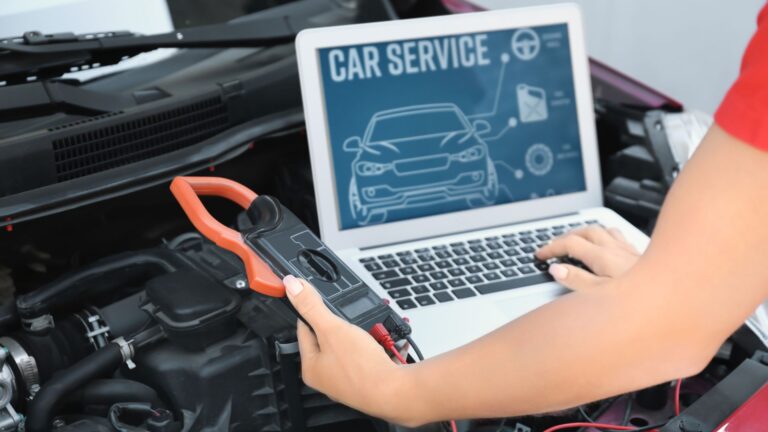
If your check engine light is on in Odessa, it’s essential not to ignore it. Although it may be tempting to keep driving and ignore the warning, doing so can lead to severe damage and expensive repairs. Ignoring the check engine light can adversely impact your vehicle’s performance, fuel efficiency, and longevity. As a car owner in Odessa, it is crucial to understand why you should take immediate action when the check engine light turns on.
In this blog, we will provide you with useful tips on how to diagnose the problem and common reasons for check engine lights. We’ll also help you understand why taking immediate action is crucial when your check engine light illuminates. As a responsible car owner, you want to ensure that your vehicle runs efficiently at all times. Therefore, it’s imperative to dive in and learn about the consequences of ignoring the check engine light!
Understanding the Implications of Ignoring the Check Engine Light
Ignoring the check engine light can have severe consequences for both your vehicle and your wallet. This warning light is a crucial indicator of potential issues with your vehicle’s systems, and ignoring it could lead to costly repairs down the line. The check engine light is often a sign of impending engine damage, which can be extremely expensive to fix. By getting immediate attention from a trusted mechanic when the check engine light comes on, you can prevent further damage and address any underlying issues before they worsen. Don’t underestimate the importance of taking action when your dashboard lights up with the check engine light. Ignoring it can result in serious problems that could have been easily prevented. It’s always better to be safe than sorry when it comes to your vehicle’s health.
What Could Possibly Trigger Your Check Engine Light?
When the check engine light in a car turns on, it can indicate various problems that range from minor to severe. The most common triggers include issues with the gas cap, ignition coils, spark plugs, catalytic converters, and oxygen sensors. Ignoring these issues can lead to more significant and expensive repairs down the road, which is why it’s important to address them as soon as possible.
To prevent these issues from happening in the first place, it’s crucial to keep up with regular maintenance and inspections. This includes getting your car serviced regularly and staying on top of recommended repairs. Additionally, paying attention to how your car runs and any unusual sounds or smells can help you catch potential issues early on
Immediate Actions to Take When Your Check Engine Light Turns On
When the check engine light of your vehicle turns on, it can be alarming. However, there are some immediate steps you can take to deal with the problem. Begin by checking your gas cap to see if it is loose or damaged, as this can trigger the light. If this isn’t the issue, it’s crucial to take your car to a reputable mechanic for diagnosis. They will use a code reader to identify the specific problem that caused the light to turn on.
Ignoring the check engine light can lead to severe problems down the road, so don’t delay in seeking professional help. Make sure to follow the recommended steps provided by your mechanic or code reader to resolve the issue promptly. It’s essential not to overlook this warning sign since it serves as an indicator for potential issues with your vehicle that require attention from a professional mechanic.
Why is it Crucial Not to Neglect the Check Engine Light?
Your vehicle’s check engine light is a crucial indicator of any engine problems that may arise. Ignoring this warning sign can lead to expensive repairs and further damage to your engine, which will ultimately impact the performance of your car. It is important to address the issue immediately to prevent additional problems and maintain the overall health of your vehicle. Neglecting the check engine light can compromise your safety and result in hefty expenses. Therefore, it is highly recommended to take prompt action whenever the warning sign appears on your dashboard.
The check engine light can illuminate for several reasons, including issues with the engine’s sensors, emissions control system, fuel system, ignition system, or exhaust system. Some common reasons for the light to come on include faulty oxygen sensors or spark plugs, a loose gas cap, or a failing catalytic converter. These issues may seem minor initially but can escalate into more significant problems if left unaddressed.
To determine why the check engine light has come on, you should take your car to a qualified mechanic or dealership who has access to diagnostic equipment that can identify the problem. Once identified, it is essential to have the issue fixed as soon as possible to avoid further complications and costly repairs down the line. Regular maintenance and addressing any issues promptly are essential for ensuring that your vehicle runs smoothly and remains safe on the road.
How Often Does a Car in Odessa Require Engine Light Diagnostics?
The frequency of engine light diagnostics for cars in Odessa is dependent on a range of factors such as age, condition, and maintenance schedule. It is crucial to get the check engine light diagnosed as soon as it turns on to avoid further issues. Regular maintenance and inspections can help prevent frequent triggers. However, due to wear and tear, older vehicles may require more frequent diagnostics than newer ones.
It’s always better to consult with a trustworthy mechanic regarding the appropriate frequency of engine light diagnostics since they have the required experience and knowledge. Ignoring engine issues can lead to major problems down the line, which can be costly in terms of both time and money. As such, prompt attention to engine problems is essential for maintaining your car’s performance and longevity.
Tips on How to Diagnose Your Check Engine Light
The check engine light is a common issue for car owners, but it’s not a threat but a tool to identify underlying performance issues. This guide provides essential tips on diagnosing the light and reducing guesswork in car trouble, ensuring your vehicle’s performance remains optimal.
- Don’t Panic: First and foremost, take a deep breath. The check engine light is a warning, not an immediate emergency. Your car’s computer system has detected a problem, but it doesn’t necessarily mean your vehicle is on the brink of disaster.
- Check for Other Warning Lights: Sometimes, the check engine light may illuminate alongside other warning lights. Take note of any additional lights that are on, as they can provide clues about the nature of the issue. For example, a flashing check engine light often indicates a more severe problem that requires immediate attention.
- Check for Simple Fixes: Some check engine light issues have straightforward solutions. For example, a faulty oxygen sensor or a malfunctioning mass airflow sensor can often be replaced without extensive mechanical knowledge. Be sure to research and assess whether you’re comfortable with a DIY fix or if it’s best left to a professional.
- Consult a Mechanic: If you’re unsure about the problem or if it requires advanced diagnostics and repair, it’s wise to consult a qualified mechanic. They have the expertise and equipment to pinpoint and address complex issues.
- Don’t Ignore It: Finally, never ignore the check engine light. Even if your vehicle seems to be running fine, the light could indicate a problem that, if left untreated, may lead to more significant and costly repairs down the road.
The check engine light doesn’t have to be a source of anxiety. It’s a valuable tool for identifying issues with your vehicle, and by following these tips, you can diagnose and address the problem promptly. Whether it’s a simple fix or a more complex issue, taking the check engine light seriously can help you maintain your car’s performance and prevent potential breakdowns. Remember, when in doubt, seek the expertise of a trusted mechanic to ensure your vehicle remains in top condition.
Common Causes of Check Engine Lights
When you see the check engine light turn on in your car while driving in Odessa, TX, it is imperative to take it seriously and not overlook it. The check engine light can illuminate due to several common causes such as problems with the oxygen sensor, catalytic converter, spark plugs, or mass airflow sensor. Even a loose or damaged gas cap can be a culprit. Ignoring the issue can lead to more significant and costly issues down the road.
To avoid future complications and expenses, it is crucial to take your vehicle to a reliable auto repair shop like Premier Car Care Center for diagnostics and repairs. A team of qualified mechanics will use advanced diagnostic tools and techniques to identify the root cause of the problem. After identifying the issue, they will provide high-quality repairs to ensure your vehicle runs smoothly and efficiently.
Promptly addressing any issues indicated by the check engine light can ensure the longevity of your vehicle. Neglecting it can lead to more severe problems in the future and ultimately become more expensive to fix. Therefore, taking your car for regular maintenance checks at a reputable auto repair shop can help avoid these problems altogether.
Conclusion
When the check engine light comes on in your vehicle, it’s important not to ignore it. This warning light is a signal that something may be wrong with your car’s engine or emissions system, and ignoring it could lead to more serious and costly issues down the road. It’s always best to address the problem as soon as possible by contacting a professional mechanic who can diagnose and repair the issue. Don’t hesitate to call us today or visit our website for expert assistance with your check engine light in Odessa. We’re here to help ensure the health and longevity of your vehicle.



